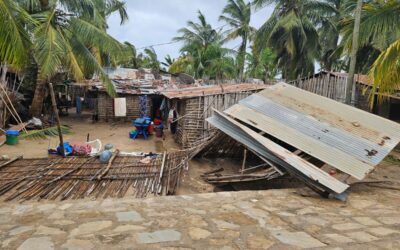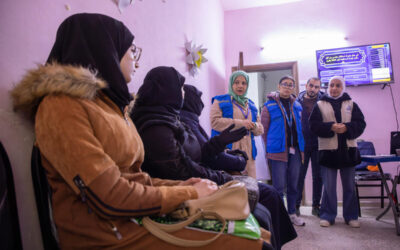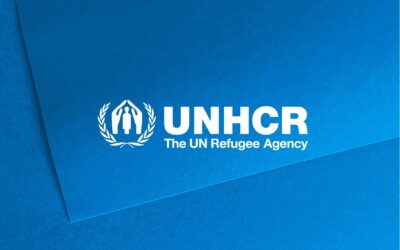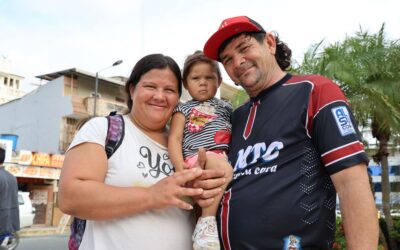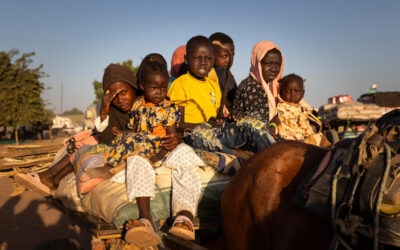News Releases
We bring you the most up-to-date information from UNHCR Canada through news releases.
Photo: © UNHCR / Roger Arnold
Cyclone Chido leaves a trail of destruction in Mozambique and beyond, displacing thousands
Tropical Cyclone Chido struck northern Mozambique over the weekend, bringing torrential rains and powerful winds that devastated communities in Cabo Delgado and Nampula provinces. The storm destroyed homes, displaced thousands, and severely damaged roads and communication networks, hampering relief efforts in areas already hosting large numbers of forcibly displaced people.
UNHCR urges more support for Syria and safety for aid workers as humanitarian activities slowly resume
Over the past 14 years of conflict and crisis, more than 13 million Syrians were forced from their homes. During this time, UNHCR and its partners have been and continue to be on the ground in Syria, delivering life-saving assistance wherever the situation allows. Figures are not yet available, but thousands of Syrian refugees have started returning to the country from Lebanon via the official Masnaa border point and other unofficial border crossings. At the same time, other Syrians have fled in the opposite direction into Lebanon.
Cartagena+40: The Chile Declaration and Plan of Action consolidate regional leadership in the protection of refugees, displaced and stateless people
Today, by adopting the Chile Declaration and Plan of Action, countries in Latin America and the Caribbean have renewed their commitment to solidarity, protection and sustainable solutions for refugees, displaced people and stateless people in the region. Its adoption marks the high point in commemorations of the 40th anniversary of the 1984 Cartagena Declaration on Refugees.
Syria: UNHCR comment on asylum processing suspension and returns
As events have just unfolded over the past few days, the situation is rapidly changing and displacement dynamics continue both within the country and across borders, in a context that has produced one of the world’s largest displacement situations. Amid the fluidity of the current situation, individual circumstances will vary, including the drivers of displacement. While thousands have already returned, hundreds of thousands of others are fleeing for their lives inside the country. Both need protection and support.
UNHCR raises alarm on surge of new arrivals in South Sudan
UNHCR, the UN Refugee Agency, is alarmed by the recent surge of people arriving in South Sudan in need of protection and assistance, with tens of thousands of people fleeing fresh violence in border areas of Sudan. More than 20,000 Sudanese from border villages crossed into South Sudan last week – tripling the number of daily arrivals compared to previous weeks.
Statement on Syria by UN High Commissioner for Refugees Filippo Grandi
Syria is at a crossroads – between peace and war, stability and lawlessness, reconstruction or further ruin. After 14 years of conflict, recent developments bring hope that the suffering of the Syrian people may finally end, and that the world’s largest forced displacement crisis can move towards just solutions.
A new strategy to support stabilization and integration of refugees and migrants in Latin America and the Caribbean
Over 4.5 million migrants and refugees* from Venezuela have obtained regular status in 17 countries in Latin America and the Caribbean since 2019, it was announced today. This was achieved thanks to the proactive measures taken by host governments within their legal frameworks, and financial support from the international community, enabling them to access documentation, regularization mechanisms and recognition of refugee status.
UNHCR receives record level of early funding to support refugees and displaced people as emergencies escalate
Donor governments pledged a record US$ 1.143 billion today to provide protection, life-saving assistance and solutions to millions of people uprooted by the increasing number of conflicts across the world, showing their support for the work of UNHCR, the UN Refugee Agency, and its partners in 2025. Along with a commitment of $355 million from UNHCR’s private sector National Partners, the total amount announced is $1.5 billion, covering 15 per cent of anticipated needs for the year.
UNHCR warns of devastating spike in risk of gender-based violence for women and girls forced to flee
Across the world, more than 60 million women and girls who are forcibly displaced or stateless face high risks of gender-based violence. While gender-based violence remains one of the most pervasive human rights violations worldwide, UNHCR, the UN Refugee Agency, warns that the risks are heightened for women and girls experiencing situations of conflict, or who have been forced to flee their homes.
UNHCR: CAR refugee returns are happening; more assistance needed to sustain trend
As the Central African Republic (CAR) continues moving toward recovery from a protracted crisis, there has been a modest but important return of refugees to the country, and UNHCR, the UN Refugee Agency, is urging the international community to intensify its support to ensure the trend is sustained.
To inquire about news releases, please reach out to our Media Contact:
Media Contact
Levon Sevunts
Communications Officer
P: +1 613-286-6975
E: sevunts@unhcr.org
Darcy Knoll
Senior Communications Officer
P: +1 613-219-4446
E: knoll@unhcr.org
Donate Today
Please help refugee families in need.



